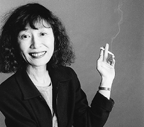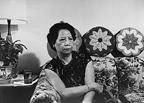Juror
Christine Choy
 [Juror’s Statement]
[Juror’s Statement]
On the surface, it seems that it would not be difficult to define the documentary genre. Documentaries are first and foremost people telling us about their lives—but we all know that people have selective memories when disclosing intimate details about themselves. I would go so far as to say that documentaries are puzzles—there’s story A, which is somehow related to story B, which has no connection at all to story C, which is definitely connected to story D, which has its own internal connections with story A . . .
Thus, I have to deconstruct each element to answer simple but elusive questions: “What is Truth? What are Truths? What are lies?” And I must discover the inner, hidden agenda of stories that might be classified according to the following categories: Screaming for Justice, Search for Identity (as a group or individual), and State or National Propaganda—Loud and Clear. A documentary filmmaker thus looks for clues and resolutions within a complex set of circumstances: psychological, social, racial, political; finally revisiting the old womb in which these factors originated.
The very word documentary implies document, or visual text. The documentary is more powerful than any medium, for it captures both words and visuals, and serves as the voice of the underclass, because they reveal a side of reality that the Establishment prefers to keep hidden. And yet every major Hollywood feature film has to pay homage to the documentary for its subject matter, whether it’s about teenage sex, pirates in Norway, or Japanese businessmen in Manhattan. The funny thing is, it doesn’t work that way in reverse!
|
Christine Choy Born in Shanghai, went to the U.S. in 1967. Has produced/directed more than fifty works in various forms. Received M.S. degree in architecture from Columbia University and Directing Certificate from the American Film Institute. Served as a professor and the Chair of the Graduate Film and Television Department at New York University, and has taught at Yale, Cornell and SUNY Buffalo. Has received over sixty international awards, including an Oscar nomination, and fellowships from numerous organizations, including the John Simon Guggenheim Memorial Foundation, the Rockefeller Foundation, and the Asian Cultural Council. Works include Mississippi Triangle (1982-83), Best Hotel on Skid Row (1990), In the Name of the Emperor (1995), The Shot Heard Round the World (1996-97), and Ha Ha Shanghai (2001). |
Who Killed Vincent Chin?
 USA / 1988 / English, Chinese / Color / 16mm / 84 min
USA / 1988 / English, Chinese / Color / 16mm / 84 min
Director: Christine Choy
Photography: Christine Choy, Nick Doob, Kyle Kibbe, Al Santana
Editing: Holly Fisher Producer: Renee Tajima
Executive Producer: Juaniata Anderson
Production Company, Source: Film News Now Foundation
It is 1982 in Detroit, a city plunged into recession by the advances of Japanese corporations. A Chinese-American named Vincent Chin is mistaken as Japanese by Ebens, just laid off from an auto plant, and is beaten to death. The light sentence is completely out of balance with the injustice of the murder and sparks a large-scale protest movement. This work pursues the truth within the incident, intertweaving news footage with testimony from relatives and witnesses.
Sparrow Village
 USA / 2003 / English, Mandarin, Miao / Color / Video / 27 min
USA / 2003 / English, Mandarin, Miao / Color / Video / 27 min
Director: Christine Choy
Photography: Ku-Ling Editing: Li-Shin Yu
Executive Producer: Lily W. Lee
Producers: Pat K.P. Yang, Christine Choy
Production Companies, Source: The Zigen Fund, Film News Now Foundation
The Miao people live in the mountains of Leishan in southwest China, where life is simple, but dignified. A look at women’s aspirations and struggles in a society in transition, with a focus on girls’ access to basic education.
